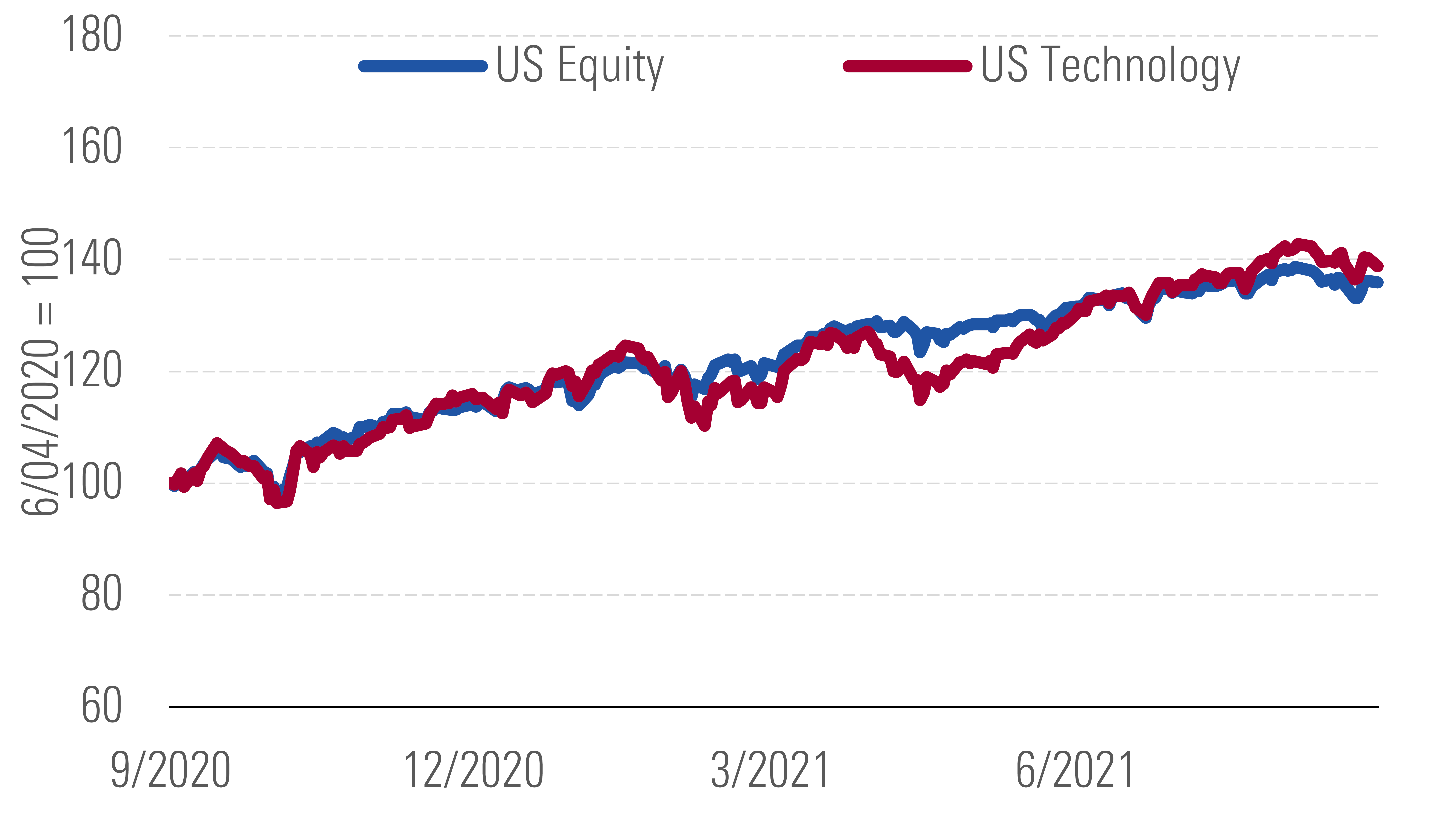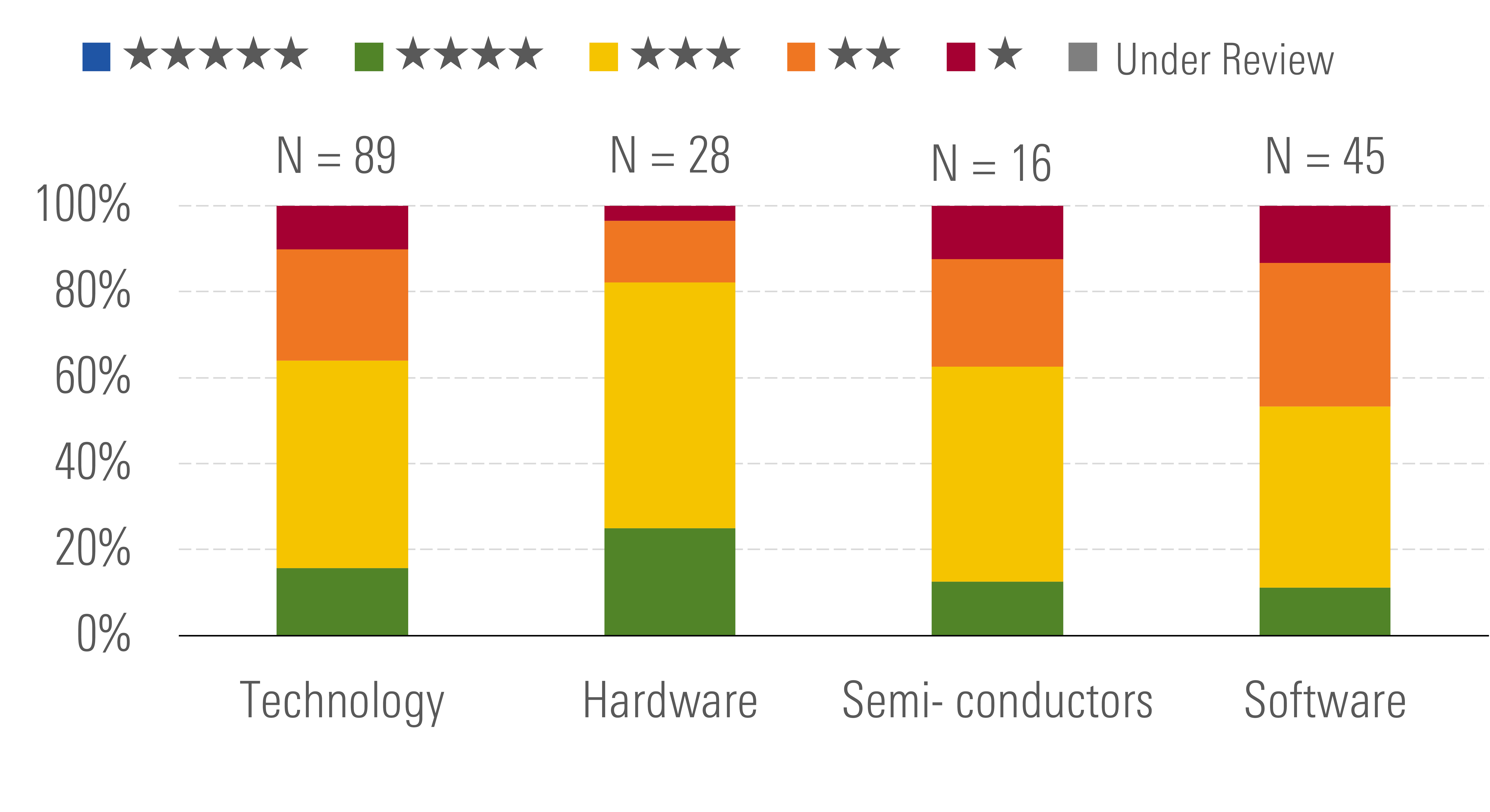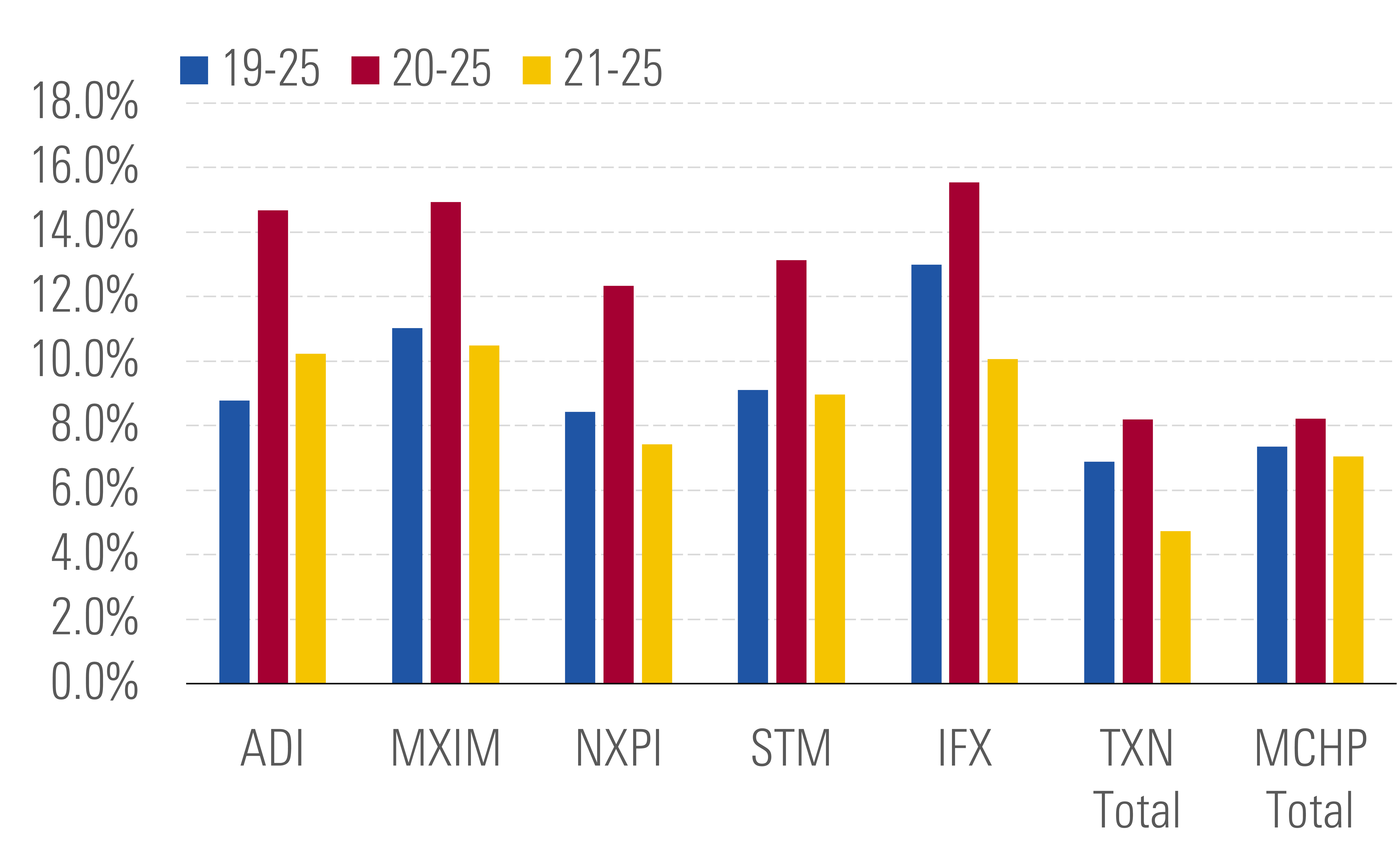Hardware and Large-Cap Software the Best Values in Tech
We're still optimistic about the cloud, 5G, and the 'Internet of Things.'
The technology sector was a strong outperformer at the beginning of the COVID-19 pandemic, but over the past 12 months, it's only modestly outperformed the broader market. Across most of tech, we're still bullish on the secular tailwinds supporting growth in areas such as cloud computing, 5G, and the "Internet of Things." However, valuations are still above our fair value estimates for the most part. We still see some stocks with moderately attractive margins of safety for investors, mostly in large-cap software, while semiconductors are the most reasonably valued subsector today.
Exhibit 1: The Gap Between Tech and the Broader Market Continues to Narrow

Source: Morningstar
The Morningstar US Technology Index was up 38.8% on a trailing 12-month basis, only modestly outperforming the U.S. equity market, which is up 35.9% on a TTM basis. Over the past three months, tech outperformed the broader market, up 6.1% compared with 3.2% for the U.S. equity market.
Exhibit 2: Buying Opportunities Are Still Hard to Find in Technology

Source: Morningstar
The median U.S. technology stock was 5% overvalued compared with 8% overvalued a quarter ago. Software is the least attractive subsector to us, as it is overvalued by 16%. Hardware is the relatively most attractive subsector, undervalued by 2%. Semiconductors are 2% overvalued, but we see modest margins of safety in wide-moat, large-cap names like Microsoft, Salesforce, and ServiceNow.
Exhibit 3: Automotive Should Remain a Strong Growth Driver for Semis

Source: Morningstar
In semis, the global chip shortage appears likely to remain until mid-2022. This bodes well for near-term results, as chipmakers ship virtually every chip they can build. It raises the question of whether a rush of orders now will lead to an inventory buildup (and pause in future chip shipments) down the line. We think this is possible, but even if so, the long-term tailwinds for the chip industry are still intact, especially in the automotive end market. We still foresee rising chip content per car, as carmakers are building more electric vehicles and installing more electronic active safety systems. In turn, broad-based analog chipmakers should generate nice revenue growth in the next few years.
In networking, the explosion of data should not be slowing down. We think this bodes well for firms with cloud computing exposure like Microsoft, but we also think that hybrid clouds will be the most prominent form of computing. Companies with exposure to both cloud and on-premises networking, such as VMware and Cisco, will not be left behind, in our view.
Top Picks
VMware VMW Star Rating: ★★★★ Economic Moat Rating: Narrow Fair Value Estimate: $202 Fair Value Uncertainty: High
We believe that VMware has developed an enviable position by becoming the commonality between clouds, including the hyperscale cloud providers, and on-premises environments. The integration of container management within its tried-and-true virtualization platform can give enterprises one solution for application and infrastructure teams, and we expect increased cross- and up-selling to come from VMware’s robust security portfolio. The firm’s migration toward subscription- and software-as-a-service offerings is well underway, and we expect VMware to benefit from customers attempting digital transformations.
Salesforce.com CRM Star Rating: ★★★★ Economic Moat Rating: Wide Fair Value Estimate: $312 Fair Value Uncertainty: Medium
We believe Salesforce.com represents one of best long-term growth stories in large-cap software. In our view, Salesforce will benefit further from natural cross-selling among its clouds, upselling more robust features within product lines, pricing actions, international growth, and continued acquisitions such as the recent Tableau and Slack deals. Salesforce is widely considered a leader in each of its served markets, which is attractive on its own, but the tight integration among the solutions and the natural fit they have with one another makes for a powerful value proposition, in our opinion.
Sensata Technologies Holding ST Star Rating: ★★★★ Economic Moat Rating: Narrow Fair Value Estimate: $75 Fair Value Uncertainty: High
Narrow-moat Sensata Technologies should continue to be a long-term beneficiary of greater content in electrified, autonomous, and connected vehicles. The company has performed well in recent quarters, and we expect content growth to lead to outperformance over the automotive and heavy-vehicle markets even amid ongoing supply constraints in 2021. Sensata’s sensors enable electrification and emissions reduction in new vehicles, and we think an accelerating proliferation of electric vehicles and global emissions regulations will be long-term secular tailwinds for the firm.

/s3.amazonaws.com/arc-authors/morningstar/5c8852db-04a9-4ec5-8527-9107fff80c09.jpg)
/cloudfront-us-east-1.images.arcpublishing.com/morningstar/2UWGQD7LCJCYNF3WQ5HHLP7UBE.jpg)
/cloudfront-us-east-1.images.arcpublishing.com/morningstar/WC6XJYN7KNGWJIOWVJWDVLDZPY.png)
/cloudfront-us-east-1.images.arcpublishing.com/morningstar/HHSXAQ5U2RBI5FNOQTRU44ENHM.jpg)
:quality(80)/s3.amazonaws.com/arc-authors/morningstar/5c8852db-04a9-4ec5-8527-9107fff80c09.jpg)